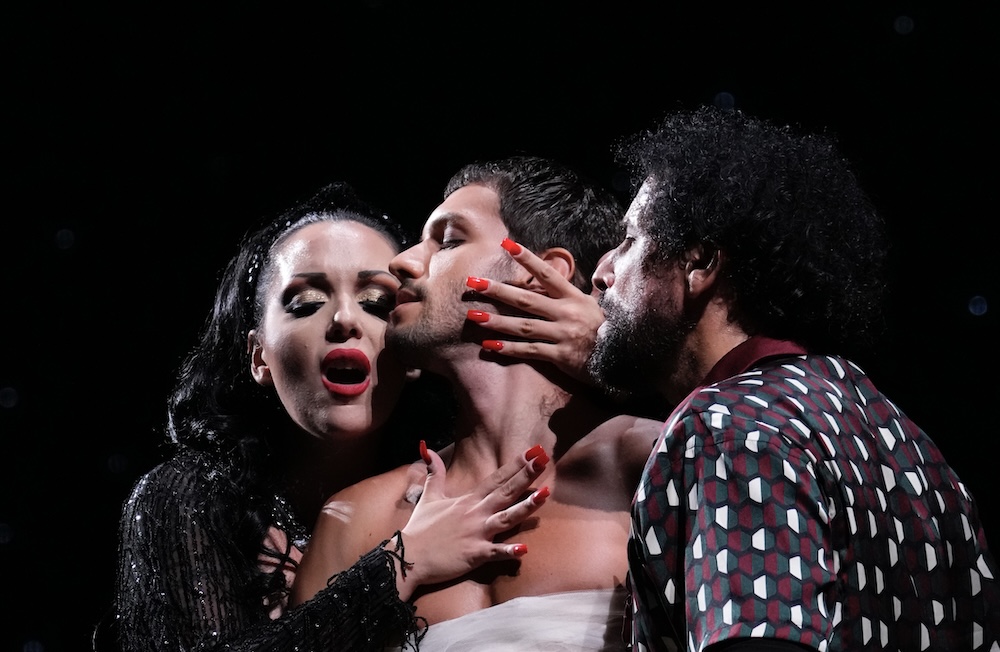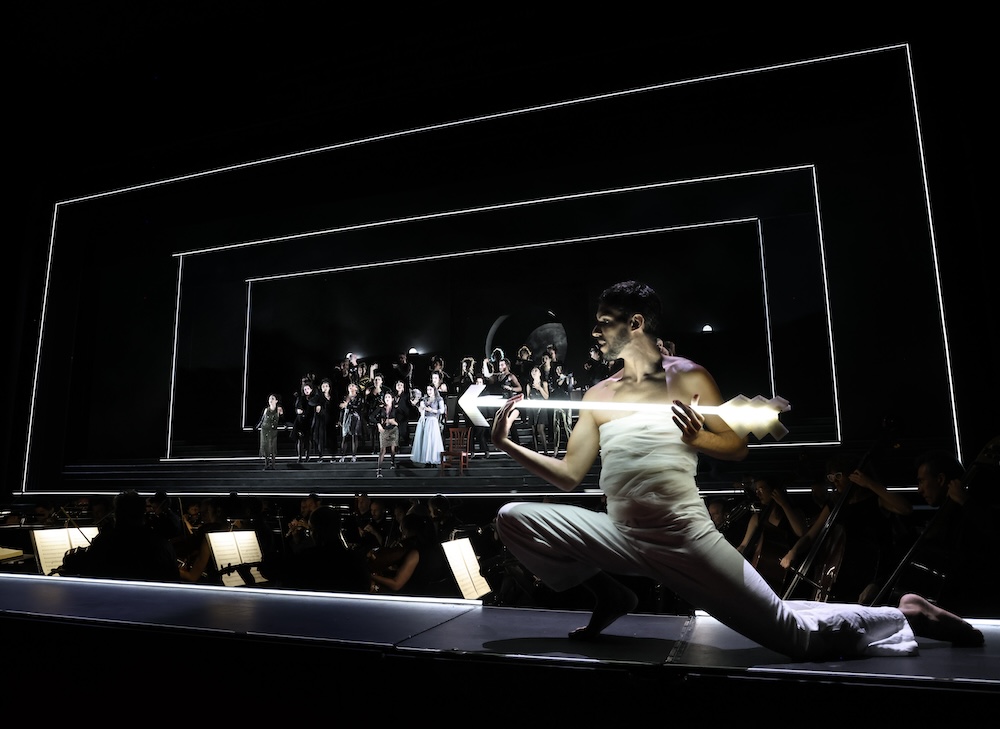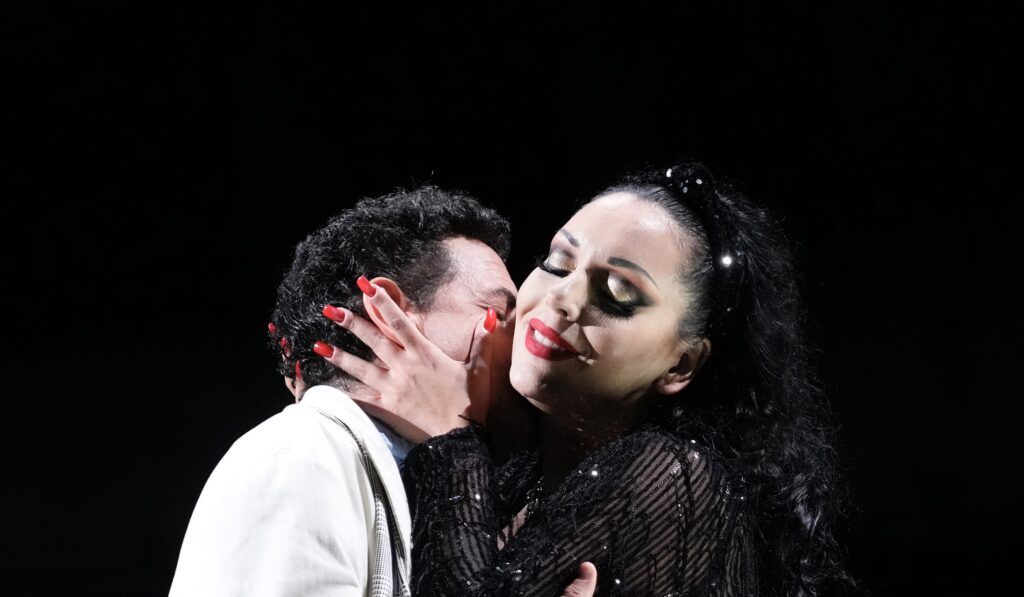Ermione (Hermione in the Greek myth, though Rossini’s opera has nothing to do with the myth or Euripides tragedy) was anticipated with great expectations both because Michele Mariotti, Pesaro’s conducting star, was its maestro, and because the 2008 Pesaro Ermione conducted by Roberto Abbado is remembered as a very successful Pesaro production — not to forget the 1987 performances with Montserrat Caballé, Marilyn Horne, Rockwell Blake and Chris Merritt.
A Greek king, Pyrrhus is engaged to Hermione, though he has fallen in love with the Trojan princess Andromache, politically unadvisable. The Mycenaean king Orestes however loves Hermione, politically inadvisable. Hermione loves Pirro, Andromache’s son (son of Hector, seen but not heard) is a political football. Pirro will marry Andromache, Hermione vows vengeance thus Oreste kills Pirro, then escapes her wrath.
Forget love versus duty, Ermione is about rage, evidently foreign to the Neapolitan public’s expectation of opera, as the opera was pulled after only a few performances.

Conductor Mariotti from the first notes of the overture placed his orchestra in an extraterrestrial space, Rossini’s play of woodwinds dancing excitedly, his crescendos piling one upon another in always new instrumental colors, a chorus intruding from time to time lamenting the lost glory of Troy. The overture to Ermione announces Rossini and the Italian operatic tradition to be in avant-garde stance.
Indeed it was Rossini venturing into new territory, building complex dramatic scenes instead of opera seria’s musical numbers. This was Rossini entering into the larger French operatic world, Rossini exploring the techniques of the Gluck reforms, and Spontini’s emotional expansions. Most importantly the Rossini opera seria recitatives that had only to advance the story in other Rossini tragedies have become full blown dramatic actions filled with vocal inflections and orchestral colors.
Yet it is Rossini, the voices of the protagonists traversing finely wrought musical lines, adding the musical excitement of masterful elaboration.
The staging was entrusted to German director Johannes Erath, in a third collaboration with Michele Mariotti. Erath created a production of enormous technical complexity, in a vast expanse that spread onto a gangway both at the sides and in front of the orchestra pit [the orchestra at the venerable Vitrifrigo Arena sits floor level, old style, together with the audience].
Director Erath and his set designer Heiki Scheele actually enclosed the orchestra within the stage picture using the gangway platforms and side wall projections to break out of the proscenium arch, thereby thrusting his actors into our space.

Onto this vast stage panoply he then placed the actions of the story on the Trojan shores, in various grand palaces, among celestial bodes and in real places that we know well — the Teatro Rossini and the Pesaro beach. Though the intimate encounter of the jealous Hermione berating the very self possessed Pyrrhus for loving Andromache took place she on a platform at the orchestra left, he 70 feet (20 meters) away on the orchestra right, shouting at one another across the RAI Symphony.
We were there, but we didn’t know where. We did know that it was high theater, reminded by the three huge rectangles of thin white light that enclosed, singly or superimposed, stage pictures from time to time.
Ermione was sung by Italian soprano Anastasia Bartoli (no relation), a silvery voiced singer of obviously very formidable technique. She is of imposing, indeed threatening presence, and has the incredible stamina required to rage brilliantly for several hours. Dressed in a highly concocted gown of sorts (a black leotard with red side bustle skirts) she let loose at Pirro for loving Andromache, then at Oreste for not knowing that he should not have avenged her by killing Pirro.
Pirro was sung by Italian tenor (really a baritenore) Enea Scala, a singer of dashing presence, and beautiful, powerful lyric voice that infused Rossini’s expressive fioratura with confident, unflappable elan. Unfortunately the Tottola libretto kills him off early in the second act, depriving us of the potential vocal glories of many alternative outcomes, not just the Act II finale where he might have had a few things to say.

Oreste was sung by Peruvian tenor Jean Diego Flórez, skillfully, very skillfully in his famed voice declaring his love for Hermione, demanding as well that Pirro execute Andromache’s son thus avoiding that the son avenge the death of his father, the Trojan Hector. Dressed in his signature white suit the 51 year old Mr. Flórez is singing in a voice of some added warmth, making this Oreste a sympathetic, somewhat pathetic, brilliantly sung soul.
Andromache was sung by Russian mezzo Victoria Yarovaya. In the Erath staging she became an even more minor character than she had become in the Tottola libretto (loosely based on Racine’s Andromaque), and, what’s more, the original Ermione was to be sung by the great Rossini tragedian Isabella Colbran (later Rossini’s wife), leaving little extra-dramaturgical excuse for additional ravings. In a white wig and rather plain gown she was more a part of the scenery in spite of her two brief, beautifully sung arias.
Of note was the non-singing presence of Andromache’s son Astianax, played by an adolescent looking young man who remained completely limp as he was dragged up and down steep steps, pulled on and off the stage — a directorially witty piece of meat whose threat to Greek security precipitated the downfall of two Greek kings, leaving on stage only the enraged daughter of the King of Sparta.
Facilitating roles were placed by Michael Mofidian as Fenicio, Martiniana Antonie as Cleone, Paola Leguizamón as Celia and Tianxuefei Sun as Attalo. The chorus of Teatro Ventidio Basso, the theater of nearby Ascoli Piceno, were the Trojans or Greeks as needed. This chorus is a formidable ensemble well able to fulfill the demands of a major production.
For the duration of the opera, conductor Mariotti held the orchestra and the stage aloft in the Rossini universe that so thrills the pilgrims to Rossini’s birthplace each year.
Michael Milenski
Vitrifrigo Arena, Pesaro, Italy, August 17, 2024. All photos copyright Amati Bacciardi, courtesy of the Rossini Opera Festival